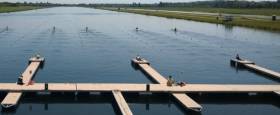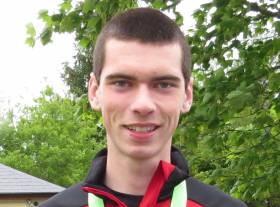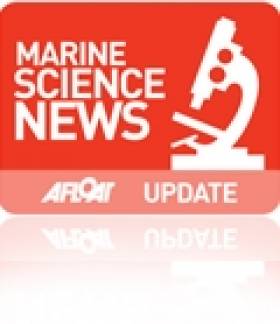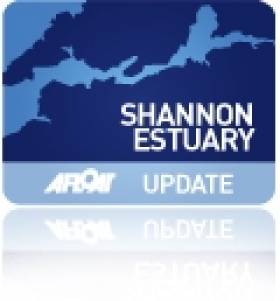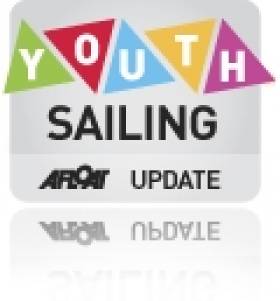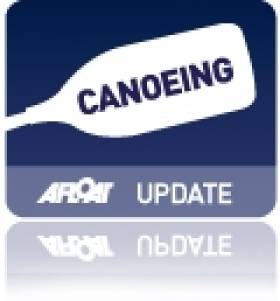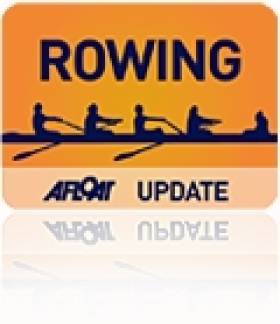Displaying items by tag: University of Limerick
Marine Notice: University of Limerick ROV Trial in Irish Sea Near Kish Bank Lighthouse
Research survey TC22017 will be carried out in the Irish Sea in the vicinity of the Kish Bank Lighthouse by the University of Limerick (UL) in collaboration with the Marine Institute from this Sunday 11 to Friday 16 December, subject to weather and operational constraints.
The aim of this survey the testing and development of UL’s underwater ROV (remotely operated vehicle) system and automation platforms.
Ship-time will be focused on trialling comprehensive multi-disciplinary control and inspection methods, utilising new technologies to enable automated offshore asset inspection.
The primary outcome of the trials is to work towards the development of a framework and technique for the inspection of offshore assets remotely.
The survey will be conducted by the RV Tom Crean (callsign EIYX3) which will display appropriate lights and signals. The operations will take place between 7am and 7pm daily. The vessel will mainly run in DP mode while the ROV operates close to Kish Bank Lighthouse.
A map and coordinates of the survey area as well as contact details and a list of equipment used can be found in Marine Notice No 84 of 2022, attached below.
#Rowing: Commercial finished second to Leander in the men’s Championship Eights at London Metropolitan Regattta at Dorney Lake today. It was one of a string of good results for Irish clubs. NUIG and Tribesmen shone and teamed up to win the women’s Championship coxed four. UCC – who took second in the Championship single sculls through Ronan Byrne – also excelled. Trinity, the University of Limerick, Shandon and Castleconnell also had wins.
London Metropolitan Regatta, Dorney Lake (Irish interest; selected results, winners unless stated)
Men
Eight – Championship: 1 Leander 5:49.90, 2 Commercial 5:52.74.
Four – Championship: 3 Commercial 6:12.20. Tier Two: Shandon.
Four, coxed – Tier Three: Tribesmen 6:32.26. Academic, Tier Two: NUIG.
Pair – Tier Two: UCC 7:14.93.
Double Sculls – Championship: 2 UCC (R Byrne, H Sutton) 6:32.50. Tier Two: Castleconnell 6:42.50.
Single Sculls – Championship: 2 UCC (R Byrne) 7:03.99. Tier Two: Univ of Limerick (K Mannix) 7:18.36. Tier Three: St Michael’s (D O’Connor).
Women
Eight – Club, Tier Two: NUIG/Tribesmen 6:50.64. Academic, Tier Two: Trinity 6:57.77.
Four – Academic, Tier Two: Trinity 7:08.62.
Four, coxed – Championship: NUIG/Tribesmen 7:20.88. Tier Four: Univ of Limerick.
Pair – Championship: 2 Commercial (H O’Neill, R Morris) 7:46.57. Tier Two: NUIG 7:39.84.
Double Sculls – Championship: 3 London/Skibbereen (M Jackson, N Long) 7:28.48.
Mannix Top Sculler at Limerick Rowing Regatta
#Rowing: Kealan Mannix won both the senior and intermediate single sculls at Limerick Regatta today. The Skibbereen man was competing for University of Limerick, who also won in the senior fours. Muckross were the top men’s club eight, while Galway won the women’s intermediate and junior eights. Castleconnell were the top men’s junior 18 eight.
Limerick Regatta, Saturday (Selected Results):
Men
Eight – Club: Muckross. Junior 18: Castleconnell. Jun 16: Col Iognaid.
Four – Sen: University of Limerick. Inter, coxed: Clonmel. Jun 18A, coxed: Castleconnell.
Pair – Sen: Portadown.
Sculling, Quadruple – Novice, coxed: Univ of Limerick. Jun 18A: CRCC.
Double – Inter: St Michael’s B.
Single – Sen: Univ of Limerick (K Mannix). Inter: University of Limerick (K Mannix). Jun 18A: St Michael’s (R Spelman).
Women
Eight – Inter: Galway. Jun 18: Galway. Jun 16: Commercial. Masters: University of Limerick.
Four – Inter, coxed: Fermoy. Jun 18: Shandon.
Pair – Jun 18: CRCC.
Sculling, Quadruple – Jun 18: Castleconnell. Jun 16, coxed: Commercial A.
Double – Inter: St Michael’s.
Single – Inter: Castleconnell (C O’Brien). Jun 18A: Castleconnell (O’Brien).
Composite Eight Fastest Crew at Castleconnell Head of the River
#Rowing: The fastest crew at the Castleconnell head of the river on Saturday was the composite men’s senior eight of the host club and the University of Limerick, who set a time of 10 minutes and 25 seconds. The fastest women’s crew, Castleconnell’s intermediate eight, came home 18th overall in a big field.
Castleconnell Head of the River, Saturday (Selected Results):
Overall: 1 Castleconnell/Univ of Limerick men’s senior eight 10:25, 2 Castleconnell men’s jun 18A quadruple 10:48, 3 Muckross men’s masters eight 11:03, 4 St Michael’s men’s senior four 11:04, 5 St Michael’s men’s masters eight 11:04, 6 Castleconnell/Killorglin men’s senior double sculls 11:08; 18 Castleconnell women’s inter eight 11:47.
Men
Eight – Intermediate: Shannon 12:04. Masters: Muckross A 11:03.
Four – Inter, coxed: Shannon A 11:25. Jun 18A, coxed: Waterford 11:52.
Pair – Senior: St Michael’s B 11:53. Jun 18A: Col Iognaid 12:55.
Sculling, Quadruple – Jun 18A: Castleconnell 10:48. Jun 16, coxed: Col Iognaid 11:37.
Double – Senior: Castleconnell, Killorglin 11:08. Inter: Castleconnell B 11:10. Junn 18A: Castleconnell A 11:33. Jun 16: St Michael’s 12:14.
Single – Senior: 1 D O’Connor 11:55. Inter: A Mozdzer 12:46. Novice: D O’Hare 13:25. Under-23: D Lynch 12:39. Jun 18A: A O’Connor 12:22. Jun 16: M Dundon 13:00. Masters: S McDonnell 13:22.
Women
Eight – Inter: Castleconnell 11:47. Novice: Univ of Limerick A 14:38.
Four – Senior: UCD 12:07.
Pair – Jun 18A: Col Iognaid B 14:32.
Sculling
Quadruple – Novice, coxed: St Brendan’s A 13:30. Jun 16, coxed: Col Iognaid 13:04.
Double – Inter: Castleconnell 13:54. Jun 18A: St Michael’s 13:10. Jun 16: Col Iognaid 14:38.
Single – Inter: R Kilkenny 14:16. Masters: N McCarthy 15:58. Novice: S Slattery 14:43. Jun 18A: G O’Brien 14:31. Jun 16: C O’Brien 14:18.
INFOMAR Annual Seminar 2013
#INFOMARseminar – A two-day INFOMAR seminar hosted by the Geological Survey of Ireland and the Marine Institute is to start tomorrow (Wednesday 9 October) in Limerick City.
Integrated Mapping for the Sustainable Development of Ireland's Marine Resources (INFOMAR) is a joint venture between the Geological Survey of Ireland and the Marine Institute. The programme is the successor to the Irish National Seabed Survey.
INFOMAR covers some 125,000 km² of Irelands most productive and commercially valuable inshore waters.
The annual INFOMAR conference will see seminar delegates meet in the Pavilion of the University of Limerick (UL) which is to be hosted by the Mobile & Marine Robotics Research Centre.
The seminar will include an update on Ireland's national seabed mapping programme including survey operations and coverage, future plans, associated research along with poster sessions.
Places to attend the free seminar were made open to all, however registration has now closed as attendance is at capacity.
To request a late registration, contact Kevin Sheehan by email: [email protected], should places become available.
For further information visit: www.eventelephant.com/infomarannualseminar2013
#ShannonEXERCISE- A two-day exercise held on the Shannon Estuary last week was a first in Europe, in that it involved testing Smartly Remotely Operated Submarines and Unmanned Aerial Vehicles.
The exercise replicating the scenario of a 43,000 tonne container ship 'Marée Noire' suffering hull damage when impacting with rock entering the Shannon Estuary due to loss of steering and floundering off the coast of Scattery Island.
The estuary off Co. Clare has become a key European test site for a range of highly advanced 'smart technologies' Marine Robots and Unmanned Aerial Vehicles.
The University of Limerick is leading the integration and deployment of the underwater and aerial technologies, within this exercise as part of a European Research Collaboration NETMAR which has Irish, UK, French, Spanish and Portuguese partners.
The exercise is a first in terms of scale and use of robotic platforms as part of Ireland's largest marine emergency response exercise to deal with a major environmental disaster.
#sywoc – University of Limerick, with Rob O'Leary as helm, have continued their winning ways into keelboats, emerging as clear winners of the trials to select Ireland's national representatives for the Student Yachting Worlds 2013 to be staged in France in late October writes WM Nixon.
UL have been on a run of success this year, as their team racers – captained by Ross Murray – won the national intervarsity opens from 26 teams in Fireflies at Tralee Bay five weeks ago. But the selection for the squad to go to the Worlds takes a different path, as it's fleet-raced in the ISA SailFleet J/80s, which will also be boat used this year at the Worlds.
The Irish selection trials were notably comprehensive, as they have been sailed in Howth over three Saturdays – April 6th, 13th and 20th. Despite April's unseasonably wintry weather, as the university racing was incorporated with the Howth YC Spring Warmer series, each day's racing got under way early. So though on two of the days conditions were to deteriorate to a gale before nightfall, the full programme was successfully completed.
Rob O'Leary and his crew started well, and were remarkably consistent. In a six race series with no discards, they notched a 1st and 2nd on all three days. As the final day's racing came up with a bit of Spring belatedly in the air, the UL team knew they had it in the bag provided they did better than a last place in either race. But for good measure, for the third time they gave it the old one two.
Irish representation will be strong at the Worlds, as defending champions UCD already have a place as of right. The series at Howth saw UCD2 shine on the scoreboard with second place, while DCU with Ryan Scott as captain placed third.
And it was a mighty busy weekend for the SailFleet J/80s, as Sunday April 21st saw all eight in full use for the ICRA Training Day, with more than a hundred participants from all over Ireland getting afloat for much expert advice, tuition and training on another welcome day of Spring.
UL Take Title at Irish Kayaking Intervarsities
#KAYAKING - The University of Limerick were overall winners in the 2012 Irish Kayaking Intervarsities at GMIT Castlebar last weekend.
As the Mayo Advertiser reports, some 500 students were on hand for the three days of competition, which kicked off with canoe polo on Lough Conn (won by GMIT over DCU).
Saturday's action saw the whitewater contest on the Clydagh River, with Limerick emerging on top, and the freestyle event on the River Clare at Tuam Wave.
Sunday closed with the long distance event at Lough Lannagh, which clinched the weekend for UL's kayakers.
Mayo also hosted the Irish Intervarsity Sailing Championships in Rosmoney last week, which attracting 200 students to the Westport area.
Queen's and Portora Impress at Erne Head
Two men’s senior eights from Queen's University slotted into the first two slots at the Erne Rowing Head of the River at Enniskillen. The junior 18 quadruple of the host club, Portora, had a fine result, finishing joint eighth overall.
Erne Head of the River, Enniskillen
Overall: 1 Queen’s A men’s senior eight 19 minutes 53 seconds, 2 Queen’s B men’s senior eight 20:21, 3 University of Limerick/St Michael’s men’s senior eight 20:40, 4 Trinity men’s intermediate eight 20:59, 5 Bann men’s junior 18 eight 21:09, 6 Methodist College, Belfast men’s junior 18 eight 21:47.
Men, Eight – Senior: 1 Queen’s A 19:53, 2 Queen’s B 20:21, 3 University of Limerick/St Michael’s 20:40. Intermediate: Trinity 20:59. Novice: 1 Trinity 21:47, 2 Queen’s 22:38, 3 Queen’s B 24:51. Junior 18: 1 Bann 21:09, 2 Methody 21:47, 3 St Joseph’s 22:02. Junior 16: St Joseph’s 23:50. Masters: Belfast BC (E) 24:06.
Four/Quadruple Sculls – Senior: 1 Belfast RC (quadruple) 23:01, 2 LSC (quad) 24:45. Intermediate: 1 Trinity (quad) 22:17, 2 Queen’s (coxed four) 23:39, 3 University of Limerick (quad) 23:59. Junior 18: 1 Portora (quadruple) 22:02, 2 Commercial (quad) 22:51, 3 Portora (coxed four) 22:56. Junior 16: Bann (quad, coxed) 24:05.
Women, Eight – Senior: 1 Trinity 23:42, 2 NUIG 23:51. Intermediate: 1 Queen’s 23:45, 2 Trinity 26:02, 3 Methody 26:16. Novice: 1 Queen’s 25:07, 2 Trinity A 26:29, 3 Trinity B 26:40. Junior 18: 1 St Michael’s 24:41, 2 Portora A 27:24. Masters: Belfast BC (D) 25:39
Four/Quadruple – Senior: 1 Portora (quadruple) 24:32, 2 Trinity (coxed four) 27:28, 3 Garda 28:11.
Click this link for Irish Rowing detailsClick this link for the Latest Rowing News
Spinnaker on Top in Team Racing National Championships
Last weekend's The Irish Team Racing Association National Team Racing Championships attracted it's largest entry for many years, with 21 teams registered.
The event was hosted by the Fastnet Marine and Outdoor Education Centre in Schull, West Cork.
Four teams travelled over from the UK, and 6 under 19 teams, all from County Cork, competed. They joined the keenest of the post-college teams and the leading university teams to constitute the largest Championships that Ireland has seen for many years. Schull, the venue for next year's World Championship, was a major attraction, but the change of date, from March to November, has made it easier for college students and school pupils to attend.

Weekend Team Racing action from Schull. More photos HERE. Photos: Brian Carlin
The weather forecasts had been predicting storms, floods and general mayhem for days if not weeks beforehand. But Saturday dawned to reveal Schull Harbour in an unusual state – the wind had disappeared! Racing started 3 hours later than planned. However, by the end of the day the first round had been completed. This was a seeded round robin, with each of the four League made up of a UK team, a leading Irish team, a leading college team and two others, including the youth teams.
The results of the first round determined entry into the second round – all the UK teams won all four leagues, with the George Knights, the George Gladiators, Supertroopers and UCD finishing second. These teams were joined in the Gold Leagues of the second round by the winners of play-offs between third place teams. The Bumsby Babes, a youth team from Royal Cork YC, had done well to win 2 races to qualify for a play-off against University of Limerick and they were in a strong position when equipment failure meant that one of their boats retired . In the subsequent re-sail UL managed to win the race and qualify.
On Sunday morning Schull was looking it's best in bright but cold sunshine. Unfortunately, the beauties of the West Cork landscape were exactly mirrored in the unruffled water of the harbour! Competitors, who had made a remarkable effort to arrive on time for an 0900 start, barely recovered from the reception organised the previous evening by the World Championship Committee, waited. When racing eventually got underway, in a fitful breeze, it quickly became obvious that there was no possibility of finishing the second round. Plan B was implemented, a knockout round between the four winners of Round One to determine the outright winner, another between the 4 Irish team placed second in the Round One Leagues to determine the ISA medal places and a Youth round.
GP14 World Champion Ian Dobson in Schull
Spinnaker came through the semis and final to win overall first place. The two Royal St George teams qualified for the final. Last year's winners, the Gladiators won the first race only after finishing places were confirmed by a redress hearing. However, the more experienced Knights went on to win the next to races to reclaim the trophy they had "lent" to the Gladiators last year. The third place play-off, which saw some of the noisiest races of the weekend, resulted in a win by Supertroopers over UCD.
In the Youth event Schull A beat Schull B to win the opportunity to take on, and eventually defeat the Bumsby Babes.
Next year's Championship will be sailed out of the Royal St. George on 12-13 November. However the next challenge for Irish team racers will be qualification for the World Championship, with selection trials planned for both the Youth and Open categories early in 2011.
The event was also the first opportunity to try the new TR3.6 which will be used for the Team Racing Worlds. Video below of the new TR3.6 and voice over from Team Racing World organiser David Harte in Schull. Stills by Brian Carlin HERE.




























